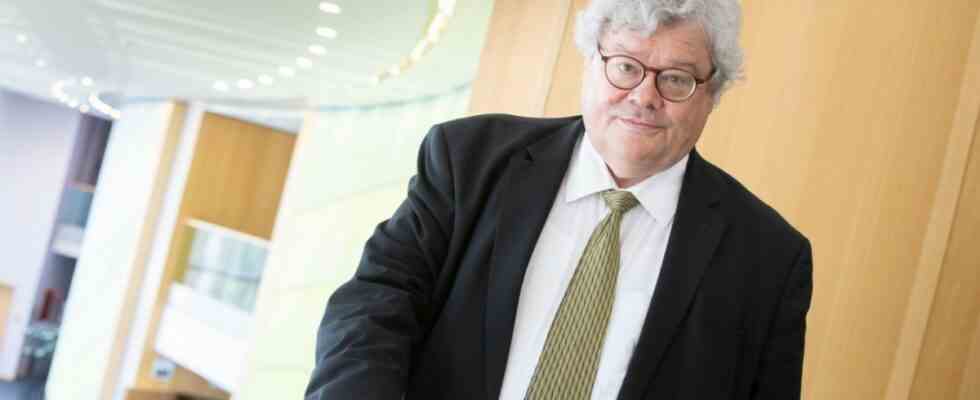Now she has actually done it: Nancy Pelosi, President of the US House of Representatives, has set foot on Taiwanese soil. Your trip to Taipei is no ordinary visit to politicians. China’s leadership sees any diplomatic contacts between foreign states and Taiwan as an affront and an attack on its territorial integrity. Beijing sees the island as part of China, and President Xi Jinping has formulated unification with the island state as one of his major goals. The Green MEP Reinhard Bütikofer, 69, is a proven connoisseur of China. Before he went to Strasbourg in 2009, he was co-leader of the Greens in Germany for six years. In the interview, he talks about a possible escalation in the conflict between China and Taiwan, which is feared by the USA, the EU and NATO because they are already under a lot of pressure with the war in Ukraine.
SZ: How dangerous is the conflict between China and Taiwan?
Reinhard Bütikofer: The conflict starts in Beijing. Taiwan does not pursue an aggressive policy. In fact, there is a fundamental conflict because the Chinese Communist Party – which has become increasingly aggressive in recent years – has been playing the chauvinist card in order to assert its claim to incorporate Taiwan into the People’s Republic, even against the will of the island. We Europeans, Japan or the USA have never accepted that. The traffic light coalition agreement states that a change in the status quo in the Taiwan Strait can only take place peacefully and with mutual consent. The conflict would become more dangerous if democracies around the world refrained from continuing to pledge their solidarity to Taiwan.
Is Taiwan in danger?
Taiwan is being attacked very intensively by China using a variety of means, including military threats. Some strategists argue that in the years between 2027 and 2035 the risk of an invasion from the mainland will be particularly high. The danger can be contained if Beijing understands that such aggression would have a very high price for the People’s Republic itself.
Why is Nancy Pelosi’s visit so sensitive for Beijing?
Beijing is trying to accustom the world to the idea that conquering Taiwan is inevitable. Of course, every gesture of solidarity and solidarity gets in the way. But it is precisely the task of democratic parliaments to strengthen this bond without abandoning the one-China policy or supporting a formal declaration of independence by Taiwan. The Vice-President of the European Parliament, Ms. Beer, was in Taiwan. More members of the EP will travel later this year. This is part of the normality that Beijing wants to revise. Beijing wants to assert its power to define the Taiwan question.
Is there a solution to this conflict at all?
Former Chinese leader Deng Xiaoping was wise enough to decide that if the Taiwan issue cannot be resolved now, it must be passed on to future generations. Xi Jinping, who gets intoxicated by the idea of Chinese hegemony in Asia and beyond, lacks this wisdom.
How big is the risk that China will imitate in Taiwan what Russia is doing in Ukraine?
There is a fundamental parallelism: for Xi, China’s future global standing is linked to control of Taiwan, just as Russia’s role is linked to control of Ukraine for Putin. But China can currently observe how Ukrainian democracy is defending itself and getting international solidarity in return. Maybe that makes the CCP think a little after all.
Can the European Union do anything about this situation?
Militarily, we don’t play a role in relation to Taiwan and we won’t play a role in the future either. But economically and politically we do weigh heavily. And we should, too, in order to deter China from taking a disastrous course.
Former Chancellor Angela Merkel has repeatedly shown great interest in China without particularly emphasizing the issue of Taiwan. Was that particularly clever or particularly bad?
At the beginning of her chancellorship, Mrs. Merkel’s China policy was not hare-hearted, but towards the end it became increasingly fearful. This was not only true for Taiwan. In doing so, Mrs. Merkel allowed and glossed over a degree of dependency on China that we must now overcome.
So far, Olaf Scholz has not shown such curiosity about China. After the experience with the Ukraine conflict, should the federal government be more articulate on the Taiwan issue?
The federal government is currently in the process of developing its China strategy. It is expected to be published in the first half of 2023. Until then, clear statements are not prohibited.
And what do you wish for?
That we learn the lesson that we are bitterly learning right now because of Russia’s dependence on fossil energy. It should also guide us in future China policy. The People’s Republic is our systemic rival, that’s not just a saying. Xi’s China is questioning our values, our interests and our democratic way of life, as NATO has rightly stated.

